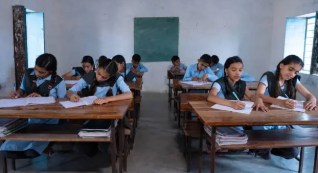Teaching is one of the most respected and rewarding career options in India, offering diverse opportunities from elementary education to higher education and beyond. It plays a crucial role in shaping the nation’s future by influencing the intellectual, social, and emotional development of students. Here’s an introduction to teaching jobs as careers in India.

1. Types of Teaching Jobs in India
Pre-primary and Primary Teachers:
- Focus on children in pre-school or elementary school.
- Typically involves teaching foundational skills (basic literacy, numeracy, and social development).
- Secondary and Higher Secondary School Teachers:
- Focus on students in Classes 6 to 12.
- Specialize in subjects like mathematics, science, social studies, languages, etc.
- College and University Professors:
- Teach undergraduate and postgraduate students in specialized disciplines.
- Often involve a combination of teaching and research.
- Vocational and Skill Development Trainers:
- Teach specific skills in areas like IT, technical trades, healthcare, etc.
2. Qualifications and Certifications
- Pre-primary and Primary Teachers:
- Diploma in Elementary Education (D.El.Ed) or Nursery Teacher Training (NTT) is typically required for teaching at the pre-primary level.
- Secondary and Higher Secondary Teachers:
- Bachelor of Education (B.Ed) is mandatory for teaching at secondary and senior secondary levels.
- A subject-specific Bachelor’s or Master’s degree (e.g., B.Sc, M.A) along with a B.Ed is usually required.
- College and University Professors:
- A Master’s degree or PhD in the relevant field is needed.
- Qualifying exams like UGC-NET (National Eligibility Test) or SET (State Eligibility Test) are essential for becoming a lecturer or assistant professor in most universities and colleges.
- Other Certifications:
- For government teaching jobs, the Teacher Eligibility Test (TET) is mandatory at the state or central level (e.g., CTET for central government schools like Kendriya Vidyalayas).
3. Types of Schools and Institutions
- Government Schools:
- Offer stable employment with benefits. Recruitment is typically through exams like State Public Service Commission Exams or CTET.
- Schools include Kendriya Vidyalayas (KVs), Navodaya Vidyalayas (NVs), and state-run schools.
- Private Schools:
- May offer better pay than government schools but with different job security.
- Leading institutions like DPS, Ryan International, and The Doon School have high standards and competitive hiring.
- International Schools:
- Offer high salaries and global exposure. These schools often follow international curricula like IB (International Baccalaureate) or IGCSE.
- Colleges and Universities:
- Public universities (like Delhi University, IITs, NITs) and private institutions (like Amity University, Manipal University) hire professors based on qualifications, research work, and publications.
4. Job Roles and Responsibilities
- Lesson Planning and Instruction: Developing and delivering engaging lessons that meet curriculum standards.
- Assessing and Evaluating Students: Regular testing, assignments, and exams to gauge student progress.
- Student Mentorship: Supporting students academically and emotionally.
- Curriculum Development: Contributing to the development of educational materials and syllabi, especially at the university level.
- Administrative Roles: Senior teachers may take on administrative tasks like coordinating departments or managing extracurricular activities.
5. Teaching Job Exams in India
- Central Teacher Eligibility Test (CTET):
- Required for teaching in central government schools like KVs and NVs.
- State Teacher Eligibility Tests (State TETs):
- Required for teaching in state government schools.
- UGC NET/JRF:
- For lecturership and research roles in universities.
- Other Exams:
- Various state and national public service commission exams for recruitment into government teaching roles.
6. Career Growth and Opportunities
- Primary and Secondary Education:
- Progression from junior teacher to senior teacher or administrative roles (e.g., headmaster, principal).
- Higher Education:
- Career growth through promotions from assistant professor to professor, department head, or even dean/vice-chancellor in universities.
- Online and Digital Education:
- With the rise of e-learning platforms like BYJU’S, Unacademy, and Vedantu, many educators are transitioning to online teaching and course creation, which offers flexibility and financial rewards.
7. Salary and Benefits
- Government Schools:
- Salaries are based on the 7th Pay Commission recommendations, offering decent pay along with benefits like job security, pension, and allowances.
- Private Schools:
- Salaries vary widely depending on the institution’s reputation, but elite private schools tend to pay well.
- Higher Education:
- College and university professors enjoy competitive salaries, especially in reputed institutions like IITs, IIMs, and NITs.
8. Challenges in the Profession
- Workload: Teachers, especially in public schools, often handle large class sizes and face administrative duties that extend beyond classroom teaching.
- Standardization: Curricular rigidity can limit creative teaching methods.
- Pay Disparity: There is a significant gap between government and private school pay, especially in rural or less reputed private institutions.
9. Emerging Trends in Teaching Careers
- EdTech and Online Learning: With the rise of technology in education, teaching careers now extend beyond traditional classrooms into online learning, virtual tutoring, and content creation for e-learning platforms.
- Specialized Roles: There is an increasing demand for special education teachers, counselors, and subject specialists.
In conclusion, teaching as a career in India offers varied and fulfilling opportunities across different levels of education, from schools to universities. With the growing emphasis on education in national development, the demand for qualified teachers is robust, and those entering the profession can expect stable career progression and personal fulfillment.
